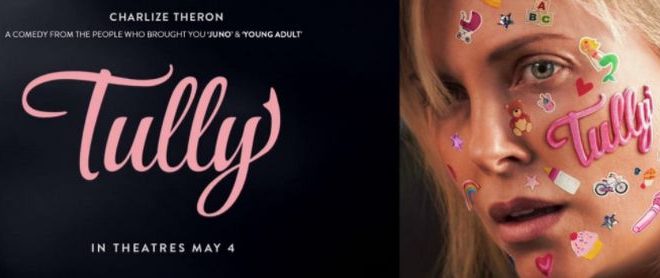
Movie Reviews
Tully
By Jennifer Verzuh
Motherhood is a gift. A miracle. It’s a message that expectant and new mothers hear often. And while there is a certain degree of truth to that statement, it also vastly oversimplifies the hard work mothers go through, and minimizes the exhaustion, frustrations, sleepless nights and boredom that accompany the joys of raising a child.
Tully, which recently played screened at the Tribeca Film Festival following its premiere at Sundance, is a film that revels in all these moments – both good and bad. There’s the happiness of singing Carly Rae Jepsen karaoke with your daughter and having your young, typically troublesome son hug you and tell you he loves you. But there’s also the agony of having him scream his head off in the car while kicking the back of your seat and the annoyance and panic you feel when you accidentally wake your newborn baby up after finally getting them to sleep because you dropped your cell phone on them.
Like all of director Jason Reitman and writer Diablo Cody’s films together, Tully is a hilarious, smart, witty and very modern film while still dealing with deeper issues. Through the laughs, their most recent collaboration also contains a surprising amount of insight about what it means to be a “good mother” and how daunting and draining a job that is while also touching on how one can love their kids and husband yet simultaneously feeling trapped, overworked and somehow unsatisfied.
No surprise, but Oscar winner Charlize Theron is really, really great in this film. There’s no pretense here with her character Marlo who is a Human Resources employee having just given birth to her third child and is too tired for that at this point. She’s honest about everything, from her fed up feelings towards her son’s private school to her casual dissatisfaction with her job and the lack of passion between her and her husband (Ron Livingston), which Theron’s reflects with a stunning authenticity. Part of the power of this performance is (as in Young Adult, although to a lesser degree here) she doesn’t feel the need to try and make this character likable constantly. She makes mistakes and says and does the wrong thing occasionally. She’s a great mother, but not by any means a perfect one.
Mackenzie Davis as the titular Tully, a night nurse gifted to Marlo by her wealthy brother (played by an always entertaining Mark Duplass) to take care of her newborn, is wonderful as well. In fact, she’s been a scene stealer for a while now (she’s great in Black Mirror’s San Junipero, The Martian and Blade Runner 2049). However, this film finds her paired with her strongest acting partner yet in Theron and she holds her own extremely well. The connection that develops between Marlo and Tully is the crux of the film, and their chemistry together (borderline romantic at times) is undeniable. Though her dialogue gives off a bit of a manic pixie girl vibe, Davis helps to feel in her shades though, making her feel more real and alive.
Tully is everything Marlo used to be and, if she’s being honest, still yearns to be. She’s free, attractive, young, smart, drifts in and out of romantic relationships with ease and has endless possibilities in front of her. It is Tully and Marlo’s unexpected friendship that forces Marlo to look at both her past and her present and consider if she made the right life decisions.
It would be a mistake though to read Tully as a film about settling. It’s more about learning to leave the past behind and to appreciate the boredom and monotony of married adult family life while still finding the occasional special moment. It’s also realizing you aren’t in your twenties anymore and maybe that is a good thing. Mainly, the film reveals how it’s perfectly okay if your family is your everything and that raising your kids while juggling a job and still managing to communicate and get along with your spouse is a pretty big accomplishment in itself.
There’s a bit of twist at the film’s ending that may divide audiences, but I can’t help but think it only made the film’s primary themes even more clear. It also encourages a rewatch and anytime when a film that does that (and more importantly, has you excited to do so) it’s usually a good thing. Oh, but before that second viewing, go ahead and call your mother. You’ll want to both thank her and apologize after seeing this.



You must be logged in to post a comment Login